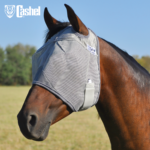If you put vinegar in your horse’s feed or water because your horse likes the taste, or to hide some unpleasant water quality, that’s fine. Some horse owners also feed vinegar to slow enterolith growth (stone-like balls that appear in the intestine) because the vinegar acidifies the gut and prevents minerals from precipitating out. It’s not clear how much to feed or if it’s truly effective, but it’s an acceptable management practice that won’t hurt your horse.
Beyond these uses, though, the wide variety of health claims made for vinegar make little-to-no sense:
Digestive aid: Several claims have been made for vinegar along these lines. One is that vinegar contains pectin, a soluble fiber. False. It contains no measurable amounts of pectin.
Another is that vinegar will aid mineral absorption by acidifying the small intestine. This might be true, but its effects depend on how efficiently the small intestinal contents are buffered, which is normally fine.
A third digestive claim is that vinegar would be good for your horse if there is inadequate stomach-acid production. Maybe, as vinegar is a mild stimulant to stomach acid secretion. It would also directly make the stomach more acidic. If older horses sometimes experience decreased stomach-acid production like older people do, this could help digestion. However, it’s a bad idea in a horse with gastric ulcers.
Treatment of arthritis and bone spurs: This claim comes from observations that vinegar makes minerals more soluble. For example, a calcium tablet put into a glass of vinegar will dissolve faster than in water. However, vinegar that’s consumed won’t work the way it does in a glass. The acetic acid in vinegar is metabolized in the liver and body cells. Drinking vinegar won’t change the acidity of the body. This idea doesn’t make sense.
Good source of vitamin C and minerals: Wrong.
Repels flies: Vinegar on the skin is mildly effective as a fly repellent but not vinegar that the horse eats.
Antiviral, antifungal, antibacterial: As with fly repellents, this is a direct-contact kind of thing, as all effects are lost if the horse consumes it.
Weight loss, ”dissolving fat”: There are reports that vinegar contributes to satiety, the feeling of fullness, and suppresses hunger. Whether this is true for horses or not is unknown. However, the effect of acetate inside the body is to suppress mobilization of fat.
Improve insulin resistance: There’s some data from humans and lab animals that shows vinegar taken before a meal or incorporated into the diet decreases the blood-glucose response and may improve measures of insulin sensitivity. The mechanisms aren’t entirely worked out but may include suppression of glucose production by the liver and suppression of digestive enzymes needed to break down sugars like sucrose. Since horses rely heavily on liver production of glucose to maintain a normal blood glucose level, and rarely have elevated glucose even when insulin resistant, use of vinegar for this purpose in horses is not advisable until it is studied to determine exactly what the effects might be.
Detoxification: References to detoxification are a common ”attention getter” but meaningless unless they specify which toxins they’re talking about. The liver detoxifies a variety of drugs, minerals and other chemicals by different pathways, each handling different things with some overlap. The claim for detoxification seems to hinge on the fact that one of the liver’s detoxing pathways uses acetyl-coA, a product of acetate. However, you can’t just throw acetic acid and the things the liver detoxifies together. The liver uses enzyme systems to alter the structure of the chemical and attach an acetyl-coA group to it, not acetic acid itself. Presenting the liver with acetic acid doesn’t result in more acetyl-coA being manufactured. The bottom line on this vinegar idea’ There’s zero truth to this claim.






